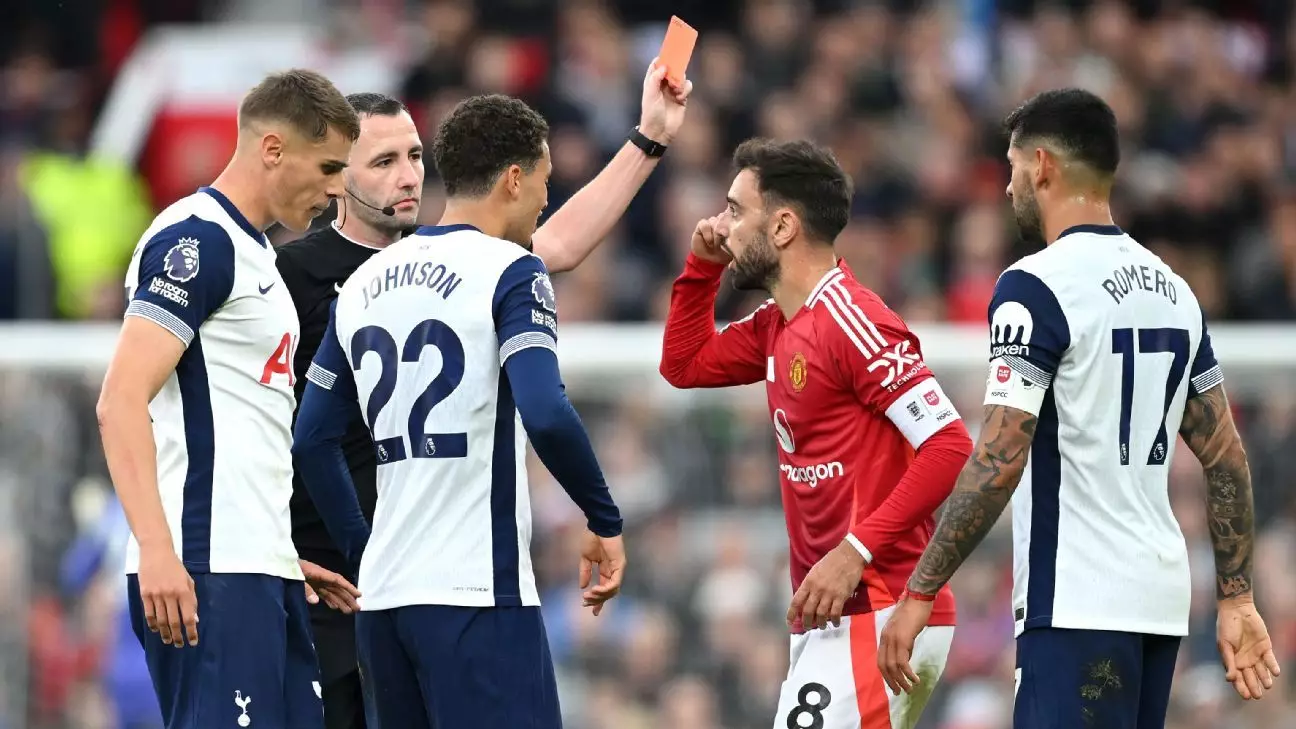On a challenging Sunday that marked a tough outing for Manchester United, the team faced a disheartening 3-0 loss to Tottenham Hotspur. This match not only highlighted strategic gaps in United’s gameplay but also became notorious for the controversial red card issued to Bruno Fernandes. The incident occurred early in the first half when Fernandes, attempting to tackle Spurs’ James Maddison, inadvertently caught him after slipping. The aftermath of this decision has since sparked a heated debate regarding officiating standards and player protection in the Premier League.
The initial judgment was made by referee Chris Kavanagh, who issued a straight red card immediately, a decision that was upheld by VAR official John Brooks. This conclusion raised eyebrows among fans and analysts alike, particularly in light of how quickly the ruling was made. While VAR is intended to provide clarity and correct potential officiating errors, it could be argued that in this particular instance, it merely compounded the situation rather than resolving it.
Fernandes’ actions in that moment appeared to be an instinctual response rather than malicious intent, leading many to view the red card as excessively harsh. The speedy escalation from a foul to a red card signals a potential inconsistency within the officiating framework. Could this incident reflect a broader issue in how modern football deals with encounters that fall into gray areas of player conduct?
Following the match, the Manchester United management swiftly moved to contest the red card, asserting that the decision was unjust. By Monday, their appeal was lodged, and the FA’s subsequent confirmation to overturn the red card on Tuesday was met with relief across the club. Fernandes is now cleared to participate in crucial upcoming matches against Aston Villa, Brentford, and West Ham, a verdict that not only bolsters United’s lineup but also validates their claim of wrongful dismissal.
The Football Association’s statement underscored the seriousness with which such appeals are taken, reinforcing the notion that justice can be served, even if it comes post-factum. Additionally, the FA’s intervention emphasizes the importance of accurate officiating in maintaining fair play in the league.
Broader Implications for Player Safety and Game Integrity
In the wake of this incident, a broader conversation emerges regarding player safety and the integrity of the game. Fernandes expressed his frustration, noting that many would agree his foul did not merit a red card. He pointed to the need to evaluate similar incidents across matches, insinuating a degree of inconsistency in how officiating standards are applied.
Such discussions are vital as they delve into the need for transparency in decision-making processes. More importantly, they raise questions about the criteria utilized by referees and VAR, and whether the current frameworks are sufficient to evaluate the complexities involved in on-field incidents, especially at critical moments within matches.
Ultimately, while Manchester United’s appeal was successful, the emotions surrounding the decision reflect deeper issues within the sport. The dialogue surrounding refereeing standards, VAR efficacy, and player rights is ongoing. As more teams face pivotal moments like Fernandes’, the involved parties must strive for clarity and fairness, ensuring that the sport’s integrity remains intact while safeguarding the players involved.

Leave a Reply